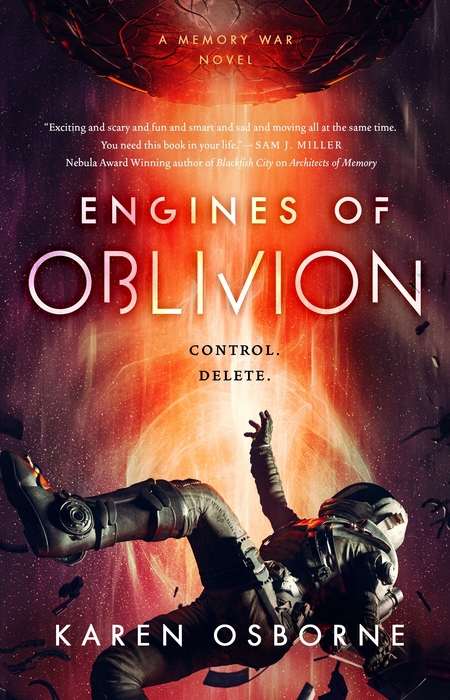If you have ever wondered what the end point of mercenary capitalism looks like, and to be fair, it beginning and mid points too, then look no further than the chillingly imaginative second instalment in the Memory War series by Karen Osborne.
Engines of Oblivion, the successor to the endlessly absorbing Architect of Memory, ramps up the capitalistic travesties of a galaxy in which corporations have taken over the administration and control of human activity, throwing things back to a type of unyieldingly callous feudalism, all in the name of market share and a burgeoning bottom line.
In this future moneyed dystopia, corporations are at war, despite the rather toothless Corporate Alliance existing to make sure such a thing does not happen, while they ceaselessly strive to get the edge in a race to the top of the company pile.
So much the same as now, you may shrug with weary resignation – unless, you’re a significant shareholder in which case you’re on the phone to your accountant ordering further purchases of holdings in companies doing what they’re supposed to – but in Osborne’s endpoint novels, the corporations offer citizenship to the lucky few and a form of indentured slavery to those who power these engines of productivity and enslavement.
Centering this time on Natalie Chan, an indentured soldier who has risen from a renegade software colony on Earth to become a citizen at the start of Engines of Oblivion, though not with a considerable of moral compromise, the kind challenged at the Nuremberg Trials where the defence of “I was just taking orders” was deemed unacceptable since you always have a choice to do the right thing, no matter the circumstances – the series renews its attack on the idea that the glories of a big, fat profit justify what means is necessary to generate them.
“Sharma’s hand closed on Natalie’s wrist a second later. Of course the doctor would recognize a transport isolette as quickly as Natalie–fat, tough things meant hauling for hauling Vai kinetics, wrapped with layers of woven fabric and topped with triple-milled titanium. But these weren’t strapped on antigrav dollies or safely stashed in some proper armory; these were set on the burly shoulders of the InGen soldiers. Each of the four men carried one, like pack mules hauling a small apocalypse.” (P. 94)
In so doing, Engines of Oblivion also takes studied aim at the idea of exploiting others to achieve that aim.
In this case, it’s not simply the grunt workers who toil in celestium mines, dying early from catastrophic disease, nor the soldiers who live and die in the service of brutal expansionism but the alien Vai who, it seems, may not be so aggressively genocidal as they have been portrayed.
While the true secret of who and what they are was unveiled with brilliant narrative power in Architect of Memory, it is taken further here, with the truth of their existence becoming grist for the capitalistic mill, no matter the lives lost or ruined and the cultures irreparably damaged.
Natalie Chan, who is joined once again by brilliant but morally dubious neuro-scientist Reva Sharma, from a birthright company family, Captain Kate Keller and Ashlan Jackson, is the focus of the gripping story in Engines of Oblivion where villainous Joseph Solano, CEO of the Aurora corporation (he is effectively a king in what passes for the future equivalent of a space-based nation-state) as she is used and abused, though with honeyed tones and seemingly beneficial contractual offers, for something locked away in her patchy memory.
Quite what it is exactly must, to avoid the spoilers which course through this immensely readable novel like silver blood, remain a thing of mystery, but suffice to say, Natalie is valuable, hugely, rule-breakingly valuable, a prize that Aurora is willing to do unspeakable things to protect and exploit and which other corporations, hot on Aurora’s trail, are happy to grab if they can.
Each of these companies speak of Chan, and those like her, for yes there are others, as if they are resources and nothing more, and while she has her corporate citizenship, something she has longed for and sliced away substantial parts of her soul for at every turn, she begins to wonder if it has been worth all the great compromise and loss of integrity.
It is Natalie’s great battle for her soul, even as corporations, specifically Aurora and Solano, fight over her body, that powers Engines of Oblivion which is one of those spectacularly dense and clever novels that has a great deal of insightful things to say, but manages to say them in a way that never feels laboured or polemic.
In fact, it is one of the most readable sci-fi novels around at the moment, possessed of a rapid-fire narrative drive that folds itself around a highly ethical core and a heart so big that it somehow manages to transcend the mercenary impulses driving so many of the key characters.
While good and bad are hazy concepts for many of the citizens of the corporations, and astonishingly, horrifyingly malleable to the Vai whose exposure to people in the theatres of war and commerce has led them to one damning conclusion, that “humans lie”, there are those in Engines of Oblivion who are willing to fight for what is right.
“Natalie flipped open the seals on her suit with more force than she probably should have, settled her feet inside, then helped Ward do the same. ‘I said I wasn’t judging you. I’m just … kind of flummoxed that you don’t know how to EVA and you’ve been living on ships for your entire adult life.’
Ward gave her a sour look, then helped Natalie snap her seals closed as Natalie did the same for him. ‘ You are judging me.’
‘Absolutely not,’ she lied.
‘Sure.'” (P. 279)
Quite whether Natalie Chan is one of them is best left to the reading but one thing that can be said is that she is faced with a choice throughout – does she make her peace with the morally slippery slope of blue-and-white-colour-schemed corporate life, or does she do what needs to be done for her friends, consequences, and they are considerable, be damned – and much of Engines of Oblivion pivots on how she and a number of others reacts to some pretty high stakes.
What Osborne does so well, in the context of a richly-told and affectingly humanistic story, is ask each of us how far we would go for fame and fortune, safety and security and material prosperity?
We might like to think we are upstanding, virtuous beings but faced with a world like that in the Memory war series, how would we handle things exactly?
It’s a soberly confronting question, and it fills this rich and beguiling space opera with a haunting wondering over and over about who humanity is and what it will do to get ahead, as a species and alone, one so powerfully profound and universally applicable that you are challenged again and again by what you might do.
Natalie Chan is the one whose head is, quite literally at times, on the chopping block and watching her she handles the immense demands placed upon her in Engines of Oblivion, and how others react for better or worse, infuses this singularly brilliant novel with a substantial richness that will have you powering through its pages, impelled ever onward by arrestingly good characters, unceasing narrative that has time enough to pause and think, and a conclusion that will chill you to the bone while wondering if possibly there is a place for hope and decency after all in the blighted affairs of future humanity?

